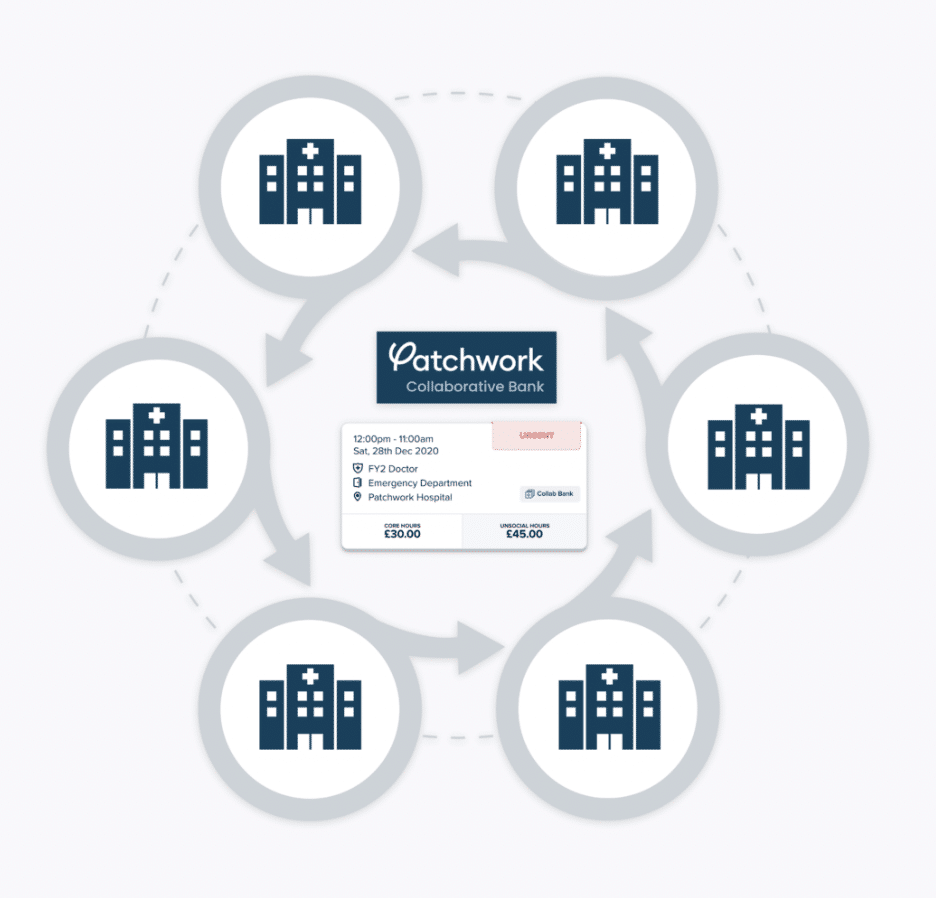From fragmentation to integration: How collaborative banks drive sustainable improvements

The Challenge
A major frustration for both clinicians and non-clinical staff are the barriers to collaboration within the NHS. This has created a myriad of challenges, from an overreliance on agency workers to duplication of admin work and isolated workforce data. Outlined below are some of the consequences of siloed working and how healthcare organisations can overcome these to make tangible improvements to workforce planning and management – all with collaborative bank technology.
A collaborative bank is a simple but powerful tool that can connect thousands of approved clinicians across organisational borders. Designed for seamless integration and user-friendliness, a collaborative bank can be used across Integrated Care Systems and multiple staff groups. Its impact? Eased staff pressure, empowered clinicians, and maintained patient care.
So, what are the challenges organisations currently face?
Higher administrative burden:
The absence of a collaborative staff bank can significantly impact an organisation, affecting not just clinicians but also administrative staff. Currently, these teams face substantial duplication of workload, expending hundreds of hours on administrative tasks. This increased administrative burden stems from the manual onboarding and approval process which must be completed every time a clinician joins an internal bank. Through Patchwork’s collaborative technology, compliance is automated and administrative teams can focus on higher-value tasks rather than being overwhelmed by paperwork. A collaborative bank removes resource-intensive processes as clinicians join just one bank, with a single approval process, enabling them to work safely across all participating organisations.
Limitations around flexible staff deployment:
Operating in silos creates a significant hurdle for organisations seeking access to a wider network of approved clinicians. The absence of a collaborative bank system limits their ability to deploy available temporary workers within their region in line with fluctuating service demand, often leading to challenges in filling shifts across different sites and departments. With organisations unable to tap into a shared staffing resource, additional strain is placed on existing internal staff to plug gaps, exacerbating the struggle to maintain adequate staffing levels in the process. Individual workers can also encounter obstacles in accessing flexible working arrangements and wider professional development opportunities due to the lack of a centralised collaborative bank.
Lack of access to data:
At present, organisations often lack comprehensive visibility of workforce data within and across Integrated Care Systems. This results in segregated working environments and disjointed systems that fail to communicate effectively. This limitation hinders an organisation’s ability to make data-driven improvements. For instance, without access to regional data, maintaining ICS-wide control over expenditure becomes challenging.
Access to enhanced and digestible workforce data would facilitate more impactful and collaborative efforts towards refining workforce management and deployment.
The Solution
Streamlined administrative processes:
By introducing a more collaborative system that integrates processes across multiple organisations, internal teams no longer need to duplicate work, saving precious time and resources. Once a clinician has been approved to join a collaborative staff bank, Patchwork’s digital passport means there’s no need to repeat the process or re-upload documents. This technology supports the safe and fluid movement of staff across borders within a region and ICS, saving time and ensuring shifts are filled quickly and in the most cost-effective way. These passporting capabilities subsequently enable organisations to meet fluctuating demand efficiently, without increasing the manual workload that comes with onboarding new bank staff.
Enhanced staffing flexibility:
Collaborative banks facilitate enhanced flexibility by enabling clinicians to work seamlessly across organisational borders. This flexibility allows clinicians to access a wider range of shifts and provides workers with greater control over their schedules.
By breaking down traditional barriers, wider professional development and training opportunities are available to clinicians, without jeopardising the staffing needs of other organisations in the collaborative. This enhanced flexibility also contributes to improved workforce management for healthcare organisations, ensuring more efficient staffing and better patient care across the entire healthcare system.
By leveraging collaborative technology, organisations in the North West of England can now more easily empower their workforce. Patchwork established the largest collaborative bank in the country, granting over 5500 clinicians the flexibility to work across 24 trusts safely and efficiently. This resulted in over 171,000+ hours of shifts worked, and £6.4 million retained in just the first two years. At Warrington and Halton Hospitals NHS Foundation Trust, 10% of shifts have been repeatedly filled by trainees via the NHS Collaborative Bank – MWL.
This was achieved by creating partnerships between NHS organisations to allow approved workers to safely and seamlessly book shifts across multiple sites. With no borders across a region, organisations can easily tap into new staffing resources they would not previously have had access to.
“As a lead employer, the main thing that we were looking for was an improved trainee experience because that is our ethos, that’s exactly what we’re all about. So for us, we needed quality metrics on trainee experience, and we were able to achieve that early on.”
Malise Szpakowska, Deputy Director of Human Resources, Mersey and West Lancashire Teaching Hospitals NHS Trust
Improved cost savings and workforce visibility:
A centralised software that provides visibility over workforce spending across the region is becoming increasingly valuable within the NHS.
An effective collaborative system enables healthcare organisations to identify and address areas of high spend. Patchwork has implemented robust reporting and analytics tools that enhance workforce visibility, aiding in effective planning, budget management, and cost reduction strategies. Through our partnerships with organisations, we’ve helped to foster collaboration and data sharing between trusts, providing ICS-wide visibility, optimising resource allocation, and helping organisations make data-driven decisions. Through this technology, the North West London Collaborative Staff Bank has enabled four acute trusts to achieve £9.5m in cost avoidance over a two year period across local and collaborative banks, with over 6,000 medics benefitting from the adoption of the new solution.
When it comes to workforce data, success is through collaboration.
“I have been hugely impressed with Patchwork Insights. The dashboards that have been created are up-to-date and easy to use, providing me and the workforce teams across North West London with all the key data we need to track and understand our performance and outcomes.”
Programme Lead Medical Workforce Deployment Systems
